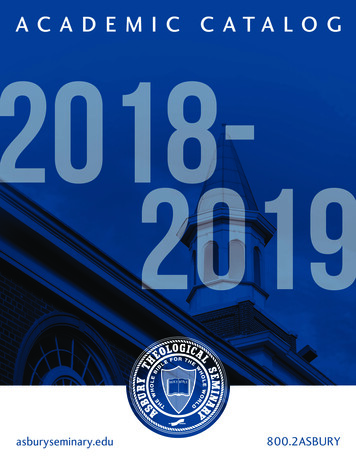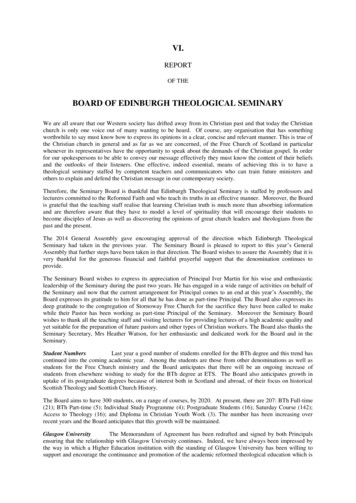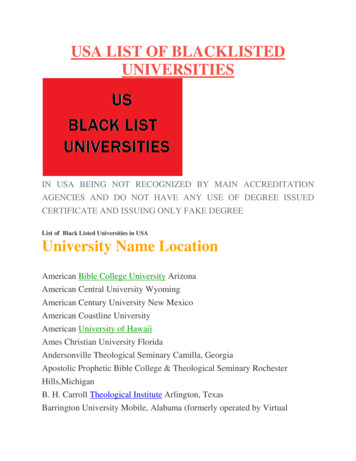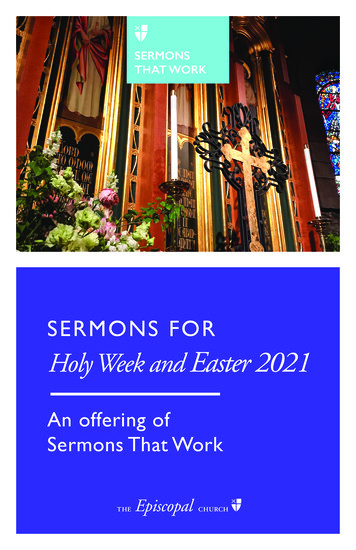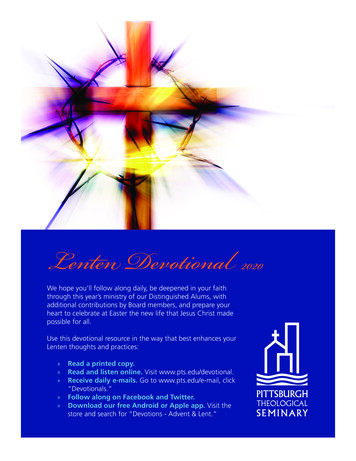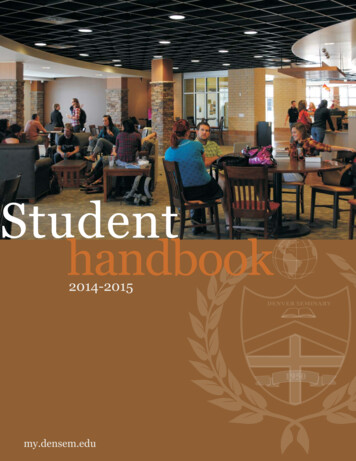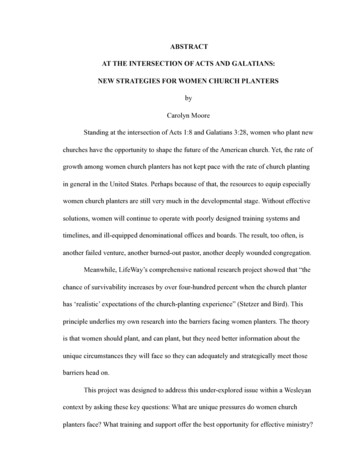
Transcription
A publication of Pittsburgh Theological Seminary1LENTENSERMONSFor those engaged in theologically reflective ministry
TABLE OF CONTENTS2As you prepare for the Lenten season, we hope that you’ll find thesereflections by Pittsburgh Theological Seminary faculty scholars to be helpful.Perhaps these sermons will inspire your own message, lead to a small groupBible study, or simply bring you closer to God—the One who in Christ hasdrawn close to us.3 What Color is Lent?Steven Tuell8 Trusting God in the WildernessLeanna Fuller15 Let Go of JesusJohn Burgess19 Twin DoubtsL. Roger Owens
CHAPTER ONEWHAT COLORIS LENT?3
Steven TuellJames A. Kelso Professor ofHebrew and Old Testament4My calendar says that today is February 19, but I don’t believe it. No way havethere been only 19 days in February. There have been at least 30; I don’tknow, maybe 60. You know what I’m talking about, brothers and sisters.Those cold, grey February days just go on and on and on—and I don’t care what thegroundhog in Punxsutawney says, there are always six more weeks of winter at least.Now that we’re almost to the end of February, still the 20th of March, the first day ofspring, seems light years away.Into the midst of this winter malaise comes Lent, which may seem fitting. Lent is apretty wintry season of the year: cold, dark, forbidding, unforgiving.The liturgical color for Lent is purple: an appropriately mournful and lugubrious shade.But I find myself thinking of Lent more in wintery hues—the penitential black of clergyrobes and leafless branches; the gray of Ash Wednesday daubs on foreheads and handsand of grit and salt on the highway; the off-white of sackcloth and dirty snow.Yet curiously, the word “Lent” has nothing to do with winter or darkness or fastingor penitence for that matter. The word Lent is derived from the Middle-English lenten,the Old English lencten, and the High German lenzin, all of which mean—get this—“spring”! It’s going to take me a while to wrap my head around that one.Scripture: Deuteronomy 7:6-11
All our springtime associations connect to Easter, and rightly so. In the sixth centuryJohn of Damascus, in his great hymn that we still sing in our churches, acclaims thefeast of Christ’s resurrection as the “spring of souls” (“Come You Faithful, Raise theStrain,” Glory to God, No. 234). Even in the secular world, Easter is celebrated withsigns of new life: new clothes; eggs, brightly colored in the shades of spring flowers;bunnies, famous for their fecundity.By contrast, these 40 days of preparation are appropriately penitential. They are markedby self-examination, by prayer and fasting. We may well wish that we could skip thepreparation and go directly into the celebration, but we can’t do that.5Remember what Mark’s Gospel tells us—that after Jesus was baptized “the Spiritimmediately drove him out into the wilderness” (Mk 1:12 NRSV). The Spirit drove himout! Jesus could not avoid this time of trial, and neither can we. But we misunderstandour Lenten disciplines, brothers and sisters, if we think that the point of all this is thatwe can somehow make ourselves worthy of God’s love.In the hymn that we sang this morning, the grand old American tune “Come, YeSinners, Poor And Needy” (Glory to God, No. 415), we sang, “Come ye weary, heavyladen, lost and ruined by the fall. If you tarry ‘til you’re better you will never come atall. Let not conscience make you linger, nor of fitness fondly dream. All the fitness herequires is you feel your need of Him.” “Fitness” is vain dream. We cannot earn God’slove and regard. We can’t.“WE MAY WELL WISH THATWE COULD SKIP THEPREPARATION . . . BUT WECAN’T DO THAT.
But the good news is, we don’t have to. The text shared with us this morning fromDeuteronomy affirms that the people Israel—and, brothers and sisters, I believe we aswell as the people of God—are a people holy to the Lord our God. “The LORD yourGod has chosen you out of all the peoples on earth to be his people, his treasuredpossession” (Deut 7:6 NRSV). This isn’t a status that we must earn. It is simply the case,declared so by divine decree.We have not come to this place because we are the best and brightest. We have notcome to this place because we are great enough or good enough. In our text thismorning, the Lord says “it was not because you were more numerous than any otherpeople that the Lord set his heart on you and chose you—for you were the fewest ofall peoples. It was because the Lord loved you and kept the oath that he swore to yourancestors” (Deut 7:7-8 NRSV). It was because the Lord loved you.Brothers and sisters, we are loved by God. That’s why Jesus came to us as one of us, tosee us with human eyes, to hear us with human ears, to embrace us with human handsand human arms. That is why Jesus embraced the fullness of our humanity and did notspare himself our loneliness, our pain, our grief, even our death. New Testament scholarN. T. Wright reminds us the Bible does not say “for God was so angry with the worldthat He sent His Son.” That’s not what my Bible says. God so loved the world that Godsent God’s Son. So if we are already loved and chosen and called, why do we needLent? What is the reason for this penitential season of preparation?Remember what Lent means? This is springtime for our souls. This is a time for growth,a time for renewal, a time to embrace our God-given identity and to learn together howto live it out more fully. We reject this opportunity at our peril. In the text shared earlier,we are warned twice that the consequences of rejecting God and God’s call are grim.“The Lord repays in their own person those who reject Him. He does not delay, butrepays in their own person those who reject Him” (Deut 7:10 NRSV). So brothers andsisters, let us not reject this opportunity.Purple is the liturgical color for Lent. But I thought about wearing green, because I’mpersuaded that Lent is a green season, brothers and sisters. It’s a time of growth. Lentprovides us the opportunity, the space to dig down deeper into our tradition. Lent6
prompts us to break up the fallow ground of our cold hearts so that the water of lifecan seep down deep into the center of who we are. Lent is the time for the Spirit toprune away our dead branches so that we can bear fruit. Lent is the season of new life,springtime for our souls. Brothers and sisters, may God grant us all a green, growing,life-filled, God-filled Lent.Thanks be to God. Amen.7The Rev. Dr. Steven Tuell’s particular research interest is the biblical literature of theearly Persian period. He has written numerous articles and book reviews, includingmultiple entries in Feasting on the Word (a commentary on the Common Lectionarypublished by Westminster John Knox). Tuell has written The Law of the Temple inEzekiel 40-48 in the Harvard Semitic Monographs Series; a commentary on 1 and 2Chronicles in the Interpretation Series; a commentary on Ezekiel, published by Bakerin the Understanding the Old Testament Commentary series; and with John Strongco-edited Constituting the Community, a collection of essays on community in theHebrew Bible. Tuell has just completed a commentary on Nahum through Malachi forSmith-Helwys An ordained elder in The United Methodist Church, Tuell preaches andteaches frequently throughout the area.This sermon was preached at Pittsburgh Theological Seminary February 19, 2015 .Listen to it online: www.pts.edu/Lent16.
CHAPTER TWOTRUSTINGGOD IN THEWILDERNESS8
Leanna K. FullerAssistant Professor of Pastoral Care9We come to worship this morning standing in the midst of the season ofLent—that period of the church year that stretches between the celebrationsof Epiphany and Easter. Lent has traditionally been understood as a time ofspiritual introspection and preparation, a time when we examine our own hearts andminds in an attempt to recognize and weed out anything within us that is inessential, orthat is keeping us from a closer relationship with God.Because of this focus on our inner lives, Lent is also a time when we reflect on ourown humanness—on that which makes us mortal, fallible, imperfect. One way thatmany Christians observe the beginning of Lent is by participating in an Ash Wednesdayservice. The ashes that are placed on the forehead during such a service help to remindus of our status as finite creatures whose earthly life is limited. From dust we came, sothe saying goes, and to dust we will each return. The ashes remind us that as humans,we are subject to sinfulness, failure, suffering, and ultimately death.Our Scripture reading for today is especially appropriate for this season in which we findourselves, because at its heart it is a very human story. It is a story about temptation,about the desire to give in to something that will bring temporary satisfaction, but thatwill ultimately lead to separation from God. It is, of course, a story about Jesus—but it isa story that describes Jesus as one of us, a human being who faced the same strugglesScripture: Luke 4:1-13
and trials that we do. And precisely because it tells of an experience which we all share,the story has much to teach us.One of the first things we might notice about this passage of Scripture is its placementin relation to other parts of the text. According to Luke, Jesus’ temptation in thewilderness comes just after his baptism in the river Jordan, and just before he beginshis ministry in Galilee. So we can see that the time of testing for Jesus comes betweentwo high points, between the recognition of his identity as the true son of God and theliving out of that identity among his own people.10So, it is this in-between time, this period between Jesus’ calling and his entrance intoministry that is the setting for his temptation. Now, when we think about temptation,we usually think of it in terms of transgressing certain norms for moral behavior: wethink of being tempted to lie, to cheat on our income taxes, or perhaps to gossip aboutother people.But these are not the kinds of temptations that Jesus had to face in our story today. Thetrials that Jesus had to endure were of a much deeper sort; they were temptations thattouch the very core of our human nature. At their most basic, they were temptationscharacterized by the desire to be in control, and to put humanity in the place of God.We can see this in all three of the tests that Jesus faced.For instance, the first test that the devil presents to Jesus is to prove his identity byturning the stones around him into bread. The text tells us that Jesus had not eatenanything for 40 days, and that he was famished. The devil knew that Jesus had thepower to do this; otherwise it wouldn’t have been a temptation for him. But the sinthat the devil was tempting Jesus to commit was not so much about using his powerinappropriately, but rather trying to control how God’s blessings would come to him inhis time of need.In other words, Jesus was tempted to take matters into his own hands and turn thestones into bread, rather than asking God to provide bread for him. Surely this issomething to which each one of us can relate. How often do we ask God for things thatwe need, and then proceed to tell God exactly how and when we wish to receive them?You see, as human beings we like to be in control, and at times that leads us to want
to control God. But, as Jesus reminds us in our story today, when we confuse our placewith God’s, we fall into sin.After Jesus passes this first test, the devil gives it another try. He shows Jesus all thekingdoms of the world and promises to give him authority over them if only Jesus willbow down and worship the devil. And yet, despite the allure of all that was offered tohim, Jesus responded to this test with humility and integrity. The price of idolatry wassimply too high. Jesus refused to commit the sin of putting something else in the placewhere God should be. As followers of Christ, we are called to respond in the same waywhen we are tempted to compromise our relationship with God to gain something forourselves.In the final scene of our story today, the devil takes Jesus up to the pinnacle of thetemple in Jerusalem, and tells him to throw himself down to prove that God willrescue him. Now, to us, this may not seem like much of a temptation, since most ofus probably would not be eager to jump from a great height just to see if God wouldintervene! But again, the temptation here is something much deeper than it may seemat first. It is not simply about putting God to the test, but it is also about having to proveGod’s place in our lives by creating sensations to attract the attention of others.You see, in Jesus’ time, miracles and wonders were extremely popular, and were oftenused to verify God’s activity in a given situation. It may be that if Jesus had followed thedevil’s suggestion, many people would have been attracted to Jesus and his ministry.But Jesus knew that to test God in this way would ultimately cause people to focus onhimself, and not on God. Even though he was the very son of God, Jesus was alwayscareful to point away from himself and to God the Creator as the proper object of ourworship. In this text and indeed throughout his ministry, Jesus made it clear that heknew where the source of his own power was, and that only God deserved the glory forit.Although Jesus the man is far removed from us in space and time, most of us canprobably identify with his experience in today’s text, as his faith was challenged in themidst of an inhospitable wilderness. At different times we have each traversed our own11
wilderness places and felt the spiritual desolation that can come with that. Perhapstoday some of us are still facing the wilderness of illness, death, grief, loneliness, orfear. Some of us may feel that we are stuck in those places where we find it hard tohear God’s voice, or to feel that God is with us. The truth of the Christian life is that it isprecisely in those wilderness places that we are most vulnerable, because that is whenour faith is truly tested in the crucible of our experience. It’s easy to say we believe inGod’s goodness and providence when things are going well for us. But when thingsstart going badly, and we suddenly find ourselves in the desert, it’s tempting to beginquestioning God’s role in our lives.We start to wonder if God really knows what’s going on, and we start to believe thatthings would be better if we were in charge. Slowly but surely, we begin trying to putourselves in the place where God should be, and that is when we go astray. Like anyother temptation, trying to gain that sense of control that we thought would be socomforting ultimately leads only to more emptiness. But, the good news that this textoffers us is that our spiritual hunger will be satisfied, though perhaps not always in theways we might predict or desire.The part that each of us has to play in this is trust: we must trust that God will remainwith us and will show us the way out of the wilderness. Our story today reminds usthat the way Jesus came through these tests of faith was by trusting in God. Afterall, Jesus was starving; he could have turned those stones into bread, but he choseinstead to trust that God would provide. Like us, Jesus was human; he could have“WE MUST TRUST THATGOD WILL REMAIN WITHUS AND WILL SHOW USTHE WAY OUT OF THEWILDERNESS.12
sought out power and recognition for himself, but instead he trusted that the Spirit ofGod that had come upon him at his baptism would be enough to draw others to him,that he didn’t need fame and fortune to accomplish God’s work. Jesus could have putGod to the test, but instead he trusted that God didn’t need to rely on sensations toreach people. He trusted that God had in store for him a better way to touch people’shearts—the way of service, and ultimately, the way of the cross.Today, as you and I journey through this Lenten season, God reminds us that in thosetimes when we are most vulnerable to tests of our faith, we are called to place our trustin God alone. Whatever the individual wilderness that each of us traverses, we have apromise that God will accompany us there, just as God accompanied Jesus in the desertso many years ago. And just as God gave Jesus the strength to resist temptation, Godpromises us the strength to face the truth of our own brokenness and to move beyondit, so that we may once again live with purpose the life to which we are each called.May it be so. Amen.The Rev. Dr. Leanna Fuller is a graduate of Vanderbilt University (Ph.D.), VanderbiltDivinity School (M.Div.), and Furman University (B.A.). Her dissertation is titled “WhenChrist’s Body is Broken: Anxiety, Identity, and Conflict in Congregations.” Fuller hasearned numerous fellowships, awards, and honors. She received the Louisville InstituteDissertation Fellowship in 2010-2011 and multiple graduate teaching fellowshipsfrom Vanderbilt. Fuller’s most recent conference paper, “From Tragedy to Vulnerability:Finitude, Difference, and Conflict in Practical Theology” was presented at the Academyof Religious Leadership Annual Meeting. Her ministry experience includes serving asassociate pastor of Oakland Christian Church in Suffolk, Va., where she coordinatedyouth ministry and Christian education programming. Fuller also worked as chaplainresident at Riverside Regional Medical Center, in Newport News, Va., providing pastoralcare for patients. Fuller’s family includes her spouse, the Rev. Scott Fuller, a UCC ministerand chaplain; and their young son, Simon.This sermon was preached at Pittsburgh Theological Seminary March 27, 2014 . Listen toit online: www.pts.edu/Lent16.13
CHAPTER THREELET GO OFJESUS14
John P. BurgessJames Henry SnowdenProfessor of Systematic Theology15I’m a member of the sandwich generation, that is to say, I’m at that age in life whereI’m sending my kids off to college and learning to care for an elderly parent. I visitedmy mother this past weekend. She lives in an assisted living facility in Pasadena, Calif.And what struck me was that as people grow older they talk a lot about their physicalailments, but what really is going on is a spiritual struggle. The questions come backagain, “Is there really a God?” and “If there is a God, does that God really care forme?”Well, interestingly, that’s the question that faced these two disciples on that Eastermorning. They had followed Jesus for three years. They had watched as he wascrucified. They had even heard from the women that he was no longer in the tomb—that he had been raised from the dead. And they were quite unimpressed. They wentfor a long walk.A visitor joins them along the way. They begin talking about the events in Jerusalem,and these two disciples are astounded. “Are you the only stranger in Jerusalem who hasnot heard of everything that has taken place?” The irony is, of course, that they are theones who really don’t understand what has taken place.Scripture: Luke 24:13-35
When we don’t understand how to see Jesus, when we don’t know anymore where tofind Jesus, when we struggle to know if there is really Emmanuel, “God with us,” Jesusmeets us along the road. He reads the Scriptures and interprets them. He breaks bread.He gives us a sermon and a supper. And ever since that moment at Emmaus, Christians,when they have wanted to see Jesus, have gone to the Scriptures and celebratedcommunion.Jesus sends us to the Scriptures to see him. The ancient theologians of the church andthen again the Reformers in the 16th century were fully confident that you can go tothe Bible and encounter the living Lord. And Jesus becomes present as we hear theScriptures read and interpreted. That is as true of the Old Testament as it is of the New.Everywhere in the Bible we are given eyes to see Emmanuel, God with us.The same thing happens when we’re invited to the table. Theologians have argued overthe centuries about what exactly it means to say “This is my body, this is my blood.” ButChristians have been fully in agreement that when they eat the bread and drink the cup,Christ himself is present. We go to the Scriptures and to the table to find Jesus.But here’s the strange thing—you notice that as soon as the disciples’ eyes wereopened, Jesus vanished from their sight. And when we come to the Scriptures and thetable to see Jesus, we’re not really going to find Jesus after all. He will have vanished.Scripture and table will not give us a Jesus that we can hold on to. But they will do this:they help us see the world with the eyes of Jesus.“. . . WHEN WE DON’TKNOW ANYMORE WHERETO FIND JESUS . . . JESUSMEETS US ALONG THEROAD.16
Here you are at seminary, and you want to see Jesus. You’re taking classes in Bible andtheology. You’re even required to take “Christology,” so that you can see Jesus. Andyou’re going to learn about worship and the sacraments and celebrating the Lord’sSupper, because there you encounter the living Lord. We gather together for Word andSacrament in the chapel because we believe that Christ himself is here. But along yourown road to Emmaus, you may also make the startling discovery that as soon as you’veseen Jesus, he vanishes.Just what does it mean to worship a God who became human flesh that we could hearand see and touch and yet now has been crucified and has vanished from our sight? Iwouldn’t want you to quote me—I speak too sharply in order to make my point—butquit looking for Jesus. Quit looking for Jesus, because the point is not for you to grabhold of Jesus but for Jesus to grab hold of you. And the point is not for you to look atJesus, but for you to look at the world that he has changed and to look at it through hiseyes.You see, when we celebrate the Lord’s Supper, when we hear the Scriptures read andinterpreted, we learn that Jesus is not just here or there but that he is the light thatilluminates everything, everywhere. So, go live in the light, do good, seek peace, andpraise the God who is always with us.The Rev. Dr. John P. Burgess is the author of Encounters with Orthodoxy: How ProtestantChurches Can Reform Themselves Again, The East German Church and the End ofCommunism, Why Scripture Matters: Reading the Bible in a Time of Church Conflict,and After Baptism: Shaping the Christian Life. He is currently a faculty mentor for theCompany of New Pastors, a Lilly Endowment-funded program that assists Presbyteriancandidates in the transition from seminary into ordained ministry. Burgess was aFulbright Scholar to Russia in 2011, a Luce Fellow in Theology for 2011-2012, and aresearch fellow at the Center of Theological Inquiry during the 2014-2015 academicyear. These awards have supported his current research on the role of the RussianOrthodox Church in shaping a new national identity for post-communist Russia.This sermon was preached at Pittsburgh Theological Seminary September 14, 2013.Listen to it online: www.pts.edu/Lent16.17
CHAPTER FOURTWIN DOUBTS18
L. Roger OwensAssociate Professor of Leadership and Ministry19Thomas gets a bad rap. We don’t call Peter “Denying Peter.” We don’t call thedisciples who slept in the garden of Gethsemane when Jesus was in agony “theDrowsy Disciples.” But Thomas is and always will be “Doubting Thomas.” Butat least he’s not alone. The Bible says Thomas was a twin. And if we are honest withourselves, we might be able to admit that we are sometimes his twin.I was Thomas’ twin not long ago on a plane from Nashville to Charlotte. I’d beenwatching the weather all morning—watching a line of storms thundering across theSoutheast. I’m an anxious flyer anyway. (Once I was telling a Bible study group aboutmy fear of flying, and someone asked if there was a part of the flight that bothered memost. “O,” I said, “just the part in the air.”) And it’s even worse when the weather’sbad. The skies were clearing in Nashville, because the storms had just passed. So whenI boarded the plane, I asked the flight attendant, “Did you just come from Charlotte?”“Yes.” “How’s the weather?” “You want me to be honest?” I had to think about thatone. “No—OK, yes.” “It’s pretty shaky.”By the time I got myself buckled in, anxiety was gripping me tighter than I was grippingthe armrests. I was doing OK until we hit the turbulence. The plane shook. Up anddown. Left and right. That’s when it became clear to me: There’s no foundation here.Nothing is holding us up. And I would like to believe God will keep us in the air, butScripture: John 20:24-31
there are enough flights God didn’t keep in the air, so why would he keep me in theair. And then I thought, “I must not really believe what I’ve preached so many times onEaster, about the resurrection, if I’m so afraid of crashing.” And it wasn’t much of a leapin my mind to get from there to, “There is no God.”When the foundations of our world start to shake, our faith can become shaky as well.Look in the mirror if you want to see Thomas’s twin, because he’s not the only one withshaky faith.It seems like the foundations have been shaking lately—as they have always been,sometimes literally: March 22—mudslide in Washington; April 2—earthquake andtsunami off the coast of Chile; April 18—avalanche on Everest; April 18—earthquakein Mexico city. Today—April 24, 2014—the one year anniversary of a garment factory’scollapse in Bangladesh. But more often the foundations shake metaphorically: stabbingat nearby high school; shooting at a Jewish community center; massacre of civilians inSouth Sudan; 20th anniversary of the Rwandan genocide. Or more personally, a middleryear seminary depression descends. A relationship dissolves. A parent, a friend, a spousedies suddenly. It’s easy to become doubting Thomas’s twin even in a place like seminary,where we think our job is to build strong foundations of faith.20The other disciples are excited and enthusiastic—“We have seen the Lord.” But Thomashas felt the foundations shake, and he hasn’t seen the Lord, so “Unless I see, I will notbelieve.” Maybe we who are Thomas’ twins can understand that.“WHEN THE FOUNDATIONSOF OUR WORLD START TOSHAKE, OUR FAITH CANBECOME SHAKY AS WELL.
Jesus can understand that as well—why else would he make an encore appearance justfor Thomas? The week after Easter the disciples are gathered again. This time Thomasis with them—he wasn’t on Easter Sunday. The others—they’re living in the peace Jesusoffered them; poor Thomas is still gripping the armrests with sweaty palms.So Jesus appears again, says “peace” again, then makes clear he’s here for Thomas.Thomas, he says, put your finger right here and see my hands, reach out your handand put it in my side. Do not doubt but believe.” Just as he showed the other disciplesthe week before, he shows Thomas today. Scars, wounds—I’ve got them, but I’m alive.Look and believe.It looks like Jesus was offering some kind of “proof,” some kind of unshakeablefoundation for belief. Maybe. But he was doing something else as well. He was alsolegitimizing Thomas’ doubt. Yes Thomas, there are good reasons to doubt. Thomas youare right: Sometimes mountains do tumble down. Sometimes the earth does shake.Sometimes tragedy strikes, and strikes hard.If the scars in Jesus’ hands and the wound in his side are proof of anything, they’reproof of this: Faith-shaking events really happen, and Jesus himself wasn’t spared theworst. We don’t get foundations. We don’t get certainty that’s immune to this kind ofdoubt. At least I don’t.Here’s what we do have: We have a God who has been buried in the mud. A Saviorfor whom the earth shook one dark Friday and was swallowed. A Savior who has“FAITH-SHAKING EVENTSREALLY HAPPEN, ANDJESUS HIMSELF WASN’TSPARED THE WORST.21
experienced the darkness, who has felt the absence of God. And yet this wasn’t the endof him.Novelist Ann Hood lost her five-year-old daughter, Grace, to a sudden and virulentform of strep. Ann had always been a spiritual seeker, a searcher, but had settledinto churchgoing with her husband, Lorne, and had come to a kind of belief. But thetragic death of her daughter ended all that. She wanted answers, and no one couldgive her any. So she stopped believing in God. “Foolishly,” she writes, “I believed thatclergypeople might hold the answers I screamed to God for every night. I watched asmy husband’s seemingly unshakeable faith wobbled too. Together, a unified force, wedrove to talk to famous rabbis, priests, religious experts on loss. Dutifully, Lorne tooknotes, asked questions, listened. But I saw how their eyes drifted toward the clocks ontheir walls, and when an hour passed, they assured us time would heal and sent us onour miserable way”—a stinging indictment of our work.So I’ve spent time wondering what I would have said. And I think maybe I wouldn’thave said anything. I would just have taken the crucifix off my wall and let her hold it.Let her see what Christianity has to say: “See, this guy had a Father whose son died.And this Son knew what it was like to be ripped by death from his Father. See, here arethe nails that made the wounds Thomas felt. Yet that wasn’t the end of him. And justbecause it wasn’t the end of him, it doesn’t have to be the end of us either.”Thomas was lucky, I think. Jesus told Thomas, “You have seen and you believe. Blessedare those who believe and yet have not seen.” That’s supposed to be us—but it’s harderthat way—which is one reason God gave us this mixed blessing called Church. Wemight not see Jesus the way Thomas did, but we can see each other plain as day. Andas Dietrich Bonhoeffer said, “The Christ in our own hearts is weaker than the Christ inthe word of other Christians.” And in the Church there are people who have learnedto live by faith, whose word has become Thomas’ confession: “My Lord and My God.”People who no longer fall down with every quake. People who have learned to live ina faith without easy answers. It might not be all of us all the time, but it is some of us.And when our faith is shaking, it’s nice to see people who don’t fall down—or t
Perhaps these sermons will inspire your own message, lead to a small group Bible study, or simply bring you closer to God—the One who in Christ has drawn close to us. 3 CHAPTER
